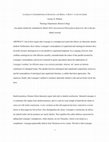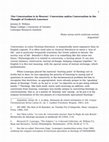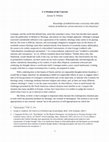Books by Jeremy D Wilkins
The Catholic University of America Press, 2018
Review by Joseph Gordon, https://readingreligion.org/books/truth
Articles & Papers by Jeremy D Wilkins
The Thomist, 2021
“Thomism” may designate the thought or perhaps the system of Aquinas. In this sense, Thomism can ... more “Thomism” may designate the thought or perhaps the system of Aquinas. In this sense, Thomism can be neither more nor less perfect than the thought of its originator; only Aquinas is the ideal Thomist, and the best we can do is internalize his lessons and defend them as the need of the hour suggests. Alternatively, “Thomism” can name a set of positions on recognized questions. These positions can be identified in retrospect. But
retrospect does not settle the present, the possibility of a living Thomism, open to dialectical purification and development in relation to new questions. Here, I take up the question of a living Thomism, but what I have to say is germane, I believe, to larger questions about the development and authority of theological traditions.
Sciences et Esprit, 2023
If we affirm that salvation occurs apart from the acceptance of Christian revelation, then either... more If we affirm that salvation occurs apart from the acceptance of Christian revelation, then either faith is not necessary for salvation, or saving faith occurs apart from the historical transmission of the Gospel. Either conclusion is difficult to reconcile with traditional Catholic doctrines. Let us suppose that it is more congruous to say that faith occurs outside the historical communion of Christ than to say that salvation occurs without faith. There arises a twofold question about the faith that occurs outside a Christian context, namely, how it is related to Jesus Christ, and how it is related to the meanings and values of the context in which it does occur. This article develops some theological categories for approaching this problem, in conversation with Aquinas, Lonergan, and the Catholic doctrinal tradition.
Gregorianum, 2025
A recent article in this journal claims that Aquinas gives necessary reasons for the Trinity whic... more A recent article in this journal claims that Aquinas gives necessary reasons for the Trinity which, however, are seen only by the eyes of faith. Its author, Michael Joseph Higgins, appeals to Rousselot, but misunderstands him, too. For Aquinas and Rousselot, the eyes of faith see not the necessity of the mysteries but rather the necessity of belief. This shapes the different kinds of arguments Aquinas gives in constructing his Trinitarian theology. The alternative constructed by Higgins is difficult to distinguish from semi-Rationalism. Our conclusion is a dialectical analysis following Lonergan’s method.
Key words: Aquinas, Rousselot, Trinity, Faith, Reason, Semi-Rationalism, Theological Method, Dialectic, Lonergan, Higgins
A descriptive and basic introduction to Lonergan's theological anthropology, in draft. Suggestion... more A descriptive and basic introduction to Lonergan's theological anthropology, in draft. Suggestions welcome.
Irish Theological Quarterly, 2020
Lonergan's well-known disciple Robert Doran has proposed to transpose the concepts of Scholastic ... more Lonergan's well-known disciple Robert Doran has proposed to transpose the concepts of Scholastic theology by identifying corresponding elements within consciousness. This article suggests that Doran's method rests on a dubious exegesis of Lonergan and does not seem a viable way to achieve the desired results. Lonergan himself proposed and practiced a different solution: his dialectical method.
Method: Journal of Lonergan Studies
This article is a companion to my "Dialectic and Transposition." It discusses the method of metap... more This article is a companion to my "Dialectic and Transposition." It discusses the method of metaphysics and the technique of metaphysical equivalence in conversation with Daniel Monsour's critique of my views. First, I suggest that Monsour (and Robert Doran) is trading in an equivocal use of 'metaphysics'. Next, I explain how metaphysics is a distinct science with its own, heuristic categories. Third, I discuss the technique of metaphysical equivalence in comparison to Robert Doran's method of transposition. Finally, I suggest that Doran's recently proposed 'generalized isomorphism' may have been inspired by Monsour's article.

International Philosophical Quarterly, 2019
Gaven Kerr argues that Lonergan is a metaphysical realist but follows an inherently idealist meth... more Gaven Kerr argues that Lonergan is a metaphysical realist but follows an inherently idealist method. Furthermore, Kerr claims, Lonergan’s isomorphism of cognitional and ontological elements does not hold, because ontological act is not parallel to cognitional judgment. In so arguing, however, Kerr conflates ontological act with efficient causality, misunderstands the nature of the parallel asserted by Lonergan’s isomorphism, and involves himself in apriori speculation about the implications of Lonergan’s method. An efficient cause is an extrinsic principle, whereas ‘act’ names an intrinsic constituent of contingent being. The parallel between ontological and cognitional composition, moreover, and the isomorphism of ontological and cognitional elements, is subtler than Kerr appreciates. The suspicion, finally, that Lonergan’s method is somehow inherently idealist is idle and not borne out by the facts.

The Thomist, 2019
The Holy Spirit, according to St Thomas's teaching in the Summa theologiae, proceeds from the Fat... more The Holy Spirit, according to St Thomas's teaching in the Summa theologiae, proceeds from the Father and the Son in the mode of will (per modum voluntatis), as proceeding love (amor procedens), as the beloved in the lover (amatum in amante), as an inclination to and impression of the beloved (inclinatio, impressio). Both the Scholastic commentary tradition and more recent scholarship attest to a problem of interpretation regarding these assertions. Interpreters do not agree about (1) whether the will emanates an operatum, parallel in some way to the procession of the inner word within the intellect, (2) what is meant by the beloved in the lover, (3) what, exactly, is Aquinas's analogue for the procession of the Spirit, and (4) how does Aquinas use the one name, 'love,' to denote an essential attribute of God, as a personal property of the Spirit, and a notional act of the Father and the Son? The majority interpretation, classically represented by John of St Thomas (Poinsot) and lately promoted by Gilles Emery, takes the beloved in the lover to be a product or term in the will emanating from the act of love, as the inner word is a reality in the intellect emanating from the act of understanding. A minority report, urged by Bernard Lonergan and others under his influence, takes the beloved in the lover to be the act of love itself, emanating into the will from the inner word in the intellect. Here I review the question and present evidence in favor of the minority interpretation. [To read this paper, please refer to The Thomist 83/4 (2019): 357-405.]
Heythrop Journal, 2018
A review essay on Frederick Lawrence, *The Fragility of Consciousness: Faith, Reason, and the Com... more A review essay on Frederick Lawrence, *The Fragility of Consciousness: Faith, Reason, and the Common Good,* ed. Randall Rosenberg and Kevin Vander Schel (Toronto: University of Toronto Press, 2016). The version posted here is the version originally submitted to the journal, prior to their editorial process. Any use of this essay should refer to the published version.
Nothing seems more passé in Trinitarian theology than the 'psychological analogy'. It is still wi... more Nothing seems more passé in Trinitarian theology than the 'psychological analogy'. It is still widely taken for granted that the psychological analogy represents a moribund strain of Latin Trinitarianism. If Augustine is the villain of this story as the originator of Latin 'essentialism,' Thomas Aquinas is generally considered to have perfected the type in his Summa theologiae. Lonergan's monumental De Deo Trino, whose systematic part represents a major development in this line, can hardly merit more than a footnote observing the last gasps of a moribund project.
If Aquinas had things right side up-and that is difficult to deny-then I have turned everything u... more If Aquinas had things right side up-and that is difficult to deny-then I have turned everything upside down." 1 Idealism in the beginning, Gilson famously warned, leads to idealism in the end. 2 Lonergan, who made 'cognitional theory' his first philosophy, is a prime suspect. At least since he began publishing his interpretation of Aquinas on understanding and the inner word, he has been accused of idealist proclivities. 3 Many have seen in his procedure a thinly veiled acquiescence to Kantian premises that cannot have ended well, despite Lonergan's protestations to the contrary.
This study examines Lonergan’s metaphysical method and some of its implications for a renewed the... more This study examines Lonergan’s metaphysical method and some of its implications for a renewed theology, in the context of Robert Doran’s efforts to bring Lonergan’s scholastic theology forward. Doran and I share a commitment to Lonergan’s metaphysical program, but understand its entailments differently. The difference comes to light in our respective readings of Lonergan’s statement, “for every [metaphysical] term and relation, there will exist a corresponding element in intentional consciousness.” For Doran, the statement includes the categories of (Lonergan’s) scholastic theology; in my judgment, it is limited to metaphysical categories in the strict sense.
[This is a slightly revised version uploaded April 13, 2017, after the introduction of a further ... more [This is a slightly revised version uploaded April 13, 2017, after the introduction of a further paragraph on the pivot from insight into phantasm to the philosophic concepts of matter and form. It is the paragraph starting on p. 15.]
Investigates the influence exercised by Thomas Aquinas on the development of Lonergan's project of "intentionality analysis."

Grace and Friendship: Theological Essays in Honor of Frederick Lawrence
As I read him, the heart of Lawrence’s project as philosophical is an articulation of the convers... more As I read him, the heart of Lawrence’s project as philosophical is an articulation of the conversational link between the transcendental structures of conscious intentionality, and the world mediated by meaning. As theological, it is historical entry into divine self-meaning. On both levels it brings into focus the decisive interplay between conversion and conversation. Here I would like to explore his achievement, starting with his dialectical appropriation of Strauss’s narrative of the three waves of modernity. Lawrence exposes the underlying issue in this dialectical process to be a counterpositional construal of consciousness as perception. Further, by transposing Strauss’s waves via the synecdoche of ‘language’, he brings into focus the extent to which the transformations are not only philosophical and political but also cultural and radically condition the possibilities for our self-understanding. He articulates the transcendental dimensions of the issue in terms of the ‘conversational’ structure of consciousness. This, in turn, makes it possible to show how what he calls Lonergan’s ‘hermeneutics of interiority’ really lays the axe to the root of the tree. Finally, he connects these dimensions to the theological and religious significance of Christian conversation.
Introduction, third draft. Rather different from the introduction as it stands in the published v... more Introduction, third draft. Rather different from the introduction as it stands in the published volume.

This paper has now been incorporated, in a revised and expanded form, as chapters two and three of my monograph, Before Truth (CUA, 2018).
My thesis, in brief, is that Lonergan is important today because the contemporary situation puts ... more My thesis, in brief, is that Lonergan is important today because the contemporary situation puts in stark relief the perennial problem for theology: the wisdom of theologians. The solution is not in the appropriation of any external ‘system’ but in the practices of self-appropriation by which the dimensions of the problem of measuring up to our tradition become explicit. The classic office of wisdom is to order, which means knowing what problems are the first problems. In theology, what is existentially first is the concrete reality of theologians in their attention, intelligence, and honesty, their freedom and loving self-surrender to Christ. The adequacy of the theologian is, concretely, theology’s first problem. Hence, I speak of Lonergan’s program as a ‘wisdom of the concrete’. It is a wisdom, for it deals with first principles; but it is of the concrete, a wisdom not through the appropriation of a system but through self-appropriation. It is a wisdom of praxis, of promoting religious, moral, and intellectual order in the soul.
Originally a lecture delivered at the Gregorian University, Rome, revised for incorporation into ... more Originally a lecture delivered at the Gregorian University, Rome, revised for incorporation into a book.
The paper shows how much decisions of translation depend on exegetical judgments made on behalf o... more The paper shows how much decisions of translation depend on exegetical judgments made on behalf of the reader, and reflects on the extent to which meaning is inevitably lost.
Uploads
Books by Jeremy D Wilkins
Articles & Papers by Jeremy D Wilkins
retrospect does not settle the present, the possibility of a living Thomism, open to dialectical purification and development in relation to new questions. Here, I take up the question of a living Thomism, but what I have to say is germane, I believe, to larger questions about the development and authority of theological traditions.
Key words: Aquinas, Rousselot, Trinity, Faith, Reason, Semi-Rationalism, Theological Method, Dialectic, Lonergan, Higgins
Investigates the influence exercised by Thomas Aquinas on the development of Lonergan's project of "intentionality analysis."
retrospect does not settle the present, the possibility of a living Thomism, open to dialectical purification and development in relation to new questions. Here, I take up the question of a living Thomism, but what I have to say is germane, I believe, to larger questions about the development and authority of theological traditions.
Key words: Aquinas, Rousselot, Trinity, Faith, Reason, Semi-Rationalism, Theological Method, Dialectic, Lonergan, Higgins
Investigates the influence exercised by Thomas Aquinas on the development of Lonergan's project of "intentionality analysis."
the scholastic assumption of metaphysics as first philosophy. In Verbum he made an initial break by expounding the psychology of Aquinas before the metaphysics. Insight marks a fundamental shift toward self-appropriation as the basic task of philosophy, and self-knowledge as its basic science. It sets up what Prof. Muratore has described as a ‘methodological demand’. The subsequent decade witnessed a series of
attempts to relate his procedure to the tradition he had inherited and to implement the method he had
devised. By the late 1960s, the methodological demand had effected a fundamental transformation, first in
Lonergan’s thinking about philosophy and then in his thinking about philosophy.